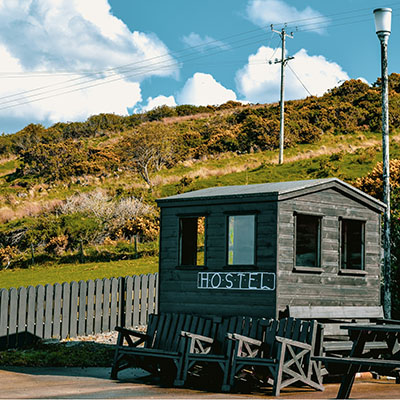Cliches are cliches for a reason. There’s usually at least a grain of truth to them. The stereotype of the broke college student exists because, well, we’re usually short of funds for those four (or more) years.
That doesn’t mean we don’t still dream big, though. If your big dreams include travel, you might need some ideas and inspiration for how you can see the world even when your wallet is looking a bit empty.
Check out our latest tips and tricks for the broke college student fulfilling their travel dreams.
6 Types of Budget-Friendly Travel for Students
“As someone who has held a passion for traveling from a young age,” said Nicolle Kain, a former college intern with Seven Corners, “I have been desperately searching for ways to see the world while working on those college loans.” Here are a few of her tactics.
1. Study abroad

As Nicolle reminds us, “Study abroad programs are designed for college students and offer a safe and inexpensive way to explore the world without putting your education on hold.”
The key to making the most of your travel dollars is choosing your study abroad destination and activities wisely. If you’re a biology major, Costa Rica or Australia might be a good fit. If you’re interested in the arts, try Italy. A good program match can make sure you’re not wasting your money.
Learn how to budget for study abroad. As much as we love travel, going deep into debt for it isn’t a smart decision.
2. Voluntouring
Volunteering abroad is a great opportunity to give back to the community you’re visiting. These trips tend to be less expensive, partly because you may be visiting an area with a lower cost of living, but also because the organizations that set up a voluntour know that you’re paying for your trip partially by working. Some missions even sponsor college students, easing even more of your financial burden.
Not all international volunteer organizations are the same. Do your homework to find one that’s reputable as well as match with the right opportunity that fits your interests, skillset, and budget. Find out more about how to be a responsible voluntourist before you make any major decisions.
3. Work exchange
Like voluntouring, you’ll be flexing a bit of muscle during your trip. With a work exchange, you pay for your room and board by providing labor to an organization. You could be working on a farm or orchard, house sitting, or helping with a sustainability project or other community effort.
Don’t worry about missing the chance to actually travel. While you are somewhat tied to a single home base, you’re usually only working for part of the day, leaving the afternoons and evenings open for exploring.
You can find these unique opportunities through groups like Workaway.
4. College ambassadors
The side hustle of being an ambassador or an influencer is one way to earn money or points for travel. Nicolle held a position as an ambassador for a travel organization when she was a student and earned a free trip by recruiting other people to the organization.

5. Contests and giveaways
People win radio and Instagram contests all the time. Why not you?
“Google ‘trip giveaways,’” says Nicolle, “and you would be surprised at how many different trip sweepstakes pop up. Be warned, however, to always read the fine print.” Know what you’re signing up for before you dish out personal information or your email address.
Don’t sweat it if you never win an all-inclusive trip. Look for contests that give away travel-related items like free luggage or airline vouchers.
6. Student travel deals
If you’re someone who knows which night each local restaurant has the best happy hour deals, you have what it takes to travel on a budget. Spend some time finding the right deals instead of booking the first thing that pops up, and you could save hundreds of dollars.
For students with flexible schedules, you’ll want to take your trip during the off- or shoulder season. It’s easier to find travel deals when the destination isn’t already overrun with other tourists.
Look for flight deals, too. Sometimes that means booking on a budget airline, but sometimes you want to choose a more mainstream airline that doesn’t nickel-and-dime you to pick your seat, check or carry on a bag, get a drink, watch a movie, or borrow a pillow. It might seem more expensive when you book the flight, but you could save more money in the end without all those hidden fees.
Instead of hotels, consider booking a hostel. Hostels are well-known in the student travel world. They’re inexpensive because they’re basic and because you’ll probably share a room with two to 15 strangers.
For more privacy, rent a room in someone’s house through Airbnb or Vrbo. You’re not necessarily looking for fancy, just safe, clean, and on budget.
Travel with a backpack. You might be a backpacker on a gap year or a weekender packing light. Either way, by traveling with a smaller bag instead of massive luggage, you could save some cash.
“It’s all about prioritizing,” says Nicolle, who admits to being guilty of overpacking from time to time. “Not only is a backpack cheaper to fly with, but the limited storage helps you resist tacky souvenirs that you may regret purchasing once you land back home.”
Finally, keep an eye out for student discounts. Lots of museums, theaters, tours, public transportation, even restaurants will offer cheaper prices if you show a valid student ID. This might be the easiest way to save a few bucks.
Is Travel Insurance Worth It?
When you’re trying to save money on travel, why would you want to spend more money on travel insurance? You might not even need to use it. But here’s the deal. The price of not protecting your trip, health, and belongings can be much higher than what you’d pay for a travel insurance plan.
Why risk losing the money you paid for your trip if you have to cancel it? Will you be able to afford replacing your luggage if it gets lost or stolen? Travel insurance can help reduce the financial risk that comes when something bad happens during your trip.
Seven Corners offers a variety of plans designed to fit every kind of trip and budget. Get a quick quote online at SevenCorners.com.
About the Authors
Nicolle Kain and Becky Hart contributed to this article. You can read more of their expert travel advice on the Seven Corners blog.
Travel Like a Pro with The Wayfinder
Did you enjoy this blog? Get more articles like it before anyone else when you subscribe to our monthly newsletter, The Wayfinder.

